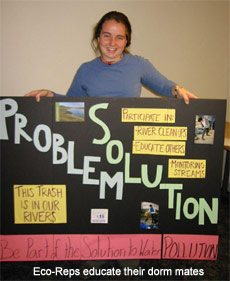The Original Tufts Eco-Rep Program
The One That Started It All…
Yes, it’s true – the Tufts Eco-Rep program was one of the first ones in the country. The amazing woman who developed and ran the program at Tufts, Anja Kollmuss, is unfortunately no longer at Tufts University. Luckily, however, her research background instilled in her a habit of documenting her work, so she left behind a wealth of resources about the Eco-Rep program as she ran it. Below you will find this information. We hope it helps you in your efforts to start or enhance your own Eco-Rep program.
After a hiatus between 2007 and 2009, the Eco-Rep program started again in a new format in Fall 2010.
On starting an Eco-Rep program
Each campus is different and each student group is different, so what works at one school might not be appropriate for another school. Nowadays there are many, many schools that have various forms of “Eco-Rep” programs, and I encourage you to look at all of them when planning your program. Some require a lot of funding, some are entirely volunteer run; some give students credit, others pay the students; some are run by staff, some by students – the possibilities are endless!
Christina Erickson at the University of Vermont wrote her PhD dissertation on the effectiveness of Eco-Rep programs (while running UVM’s Eco-Rep program!). However, before you ask anyone to give you advice, please, do your research first. Go to this page: http://www.aashe.org/resources/peer2peer.php and look up the programs at each school (if there’s not a link – go to the University’s home page and search), and then contact Eco-Rep organizers with specific questions. We will all be happy to help you get started, but the better prepared you are, the more effective we can all be with our limited time!

The Manual
This manual was developed by Anja Kollmuss at the Tufts Climate Initiative (TCI) for the ECO-Representatives undergraduate program that was also organized by TCI from 2001-2006.Eco-Reps during this time period were primarily first and second-year undergraduate students who lived in the dormitories on campus. During the Fall semester of each year they would participate in weekly meetings and focus on educating their dorm-mates about environmental issues and encouraging fellow students to live in a more eco-friendly way. The class was a cross between an official (credit-earning) course and an internship. Credits were not given, but participants were paid a stipend upon completion of the course.
Note that not all information in this manual is referenced and the Office of Sustainability no longer has access to the original sources. We encourage all users to research the material presented within these pages and find appropriate references.
Archived 2006 Manual
You can download each chapter as an editable Word Document
- Introduction & Waste Management 2006 (870 KB) – includes ‘what are eco-reps?’, schedule, expectations
- Water 2006 (940 KB)
- Climate Change 2006 (2200 KB)
- Food 2006 (720 KB)
- Population 2006 (220 KB)
- Consumption 2006 (860 KB)
- Anger and Despair, Anyone? 2006 (300 KB)
Recruitment and Retention
Project Sheets
- Project Sheet 1 – Recycling 1
- Project Sheet 2 – Recycling 2
- Project Sheet 3 – Climate Change 1
- Project Sheet 4 – Climate Change 2
- Project Sheet 5 – Climate Change 3
- Project Sheet 6 – Food 1
- Project Sheet 7 – Food 2 (detective)
- Project Sheet 8 – Water 1
- Project Sheet 9 – Water 2
Surveys
Reports
- Eco-Representatives Summary 2001 (explanation of the program)
- Eco-Representatives Summary – Updated 2005 (explanation of the program)
- Eco-Rep Evaluation Summary 2006 – (summary of student evaluations)